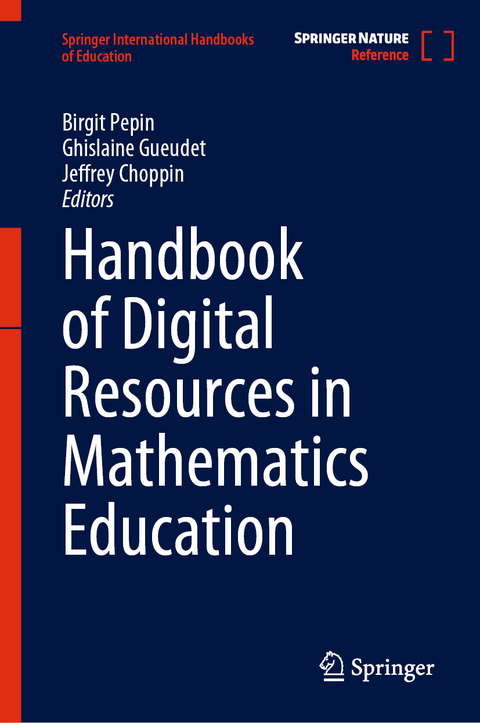
Handbook of Digital Resources in Mathematics Education
Springer International Publishing
978-3-031-45666-4 (ISBN)
With the advent of more and more open access digital resources, teachers choose from the web what they see fit for their classroom; students choose 'in the moment' what they need for their projects and learning paths. However, educators and students often find it difficult to choose from the abundance of materials on offer, as they are uncertain about their quality and beneficial use. It is clear that at a time of bouleversement of the teaching-learning processes, it is crucial to understand the quality and the (potentially) transformative aspects of digital resources. This book provides comprehensive analyses of and insights into the transformative aspects of digital resources.
lt;b>Birgit Pepin is a professor of mathematics education at Eindhoven University of Technology (Netherlands). Her research is focused on digital (curriculum) resources, their analysis, design and use by teachers and students, for their teaching and learning of mathematics, and for mathematics teacher professionalization in both school and higher mathematics education.
Ghislaine Gueudet is a professor of mathematics education at the University of Brest (France). Her research concerns the use of resources, including digital resources for the learning and teaching of mathematics from preschool to university and in teacher education.
Jeffrey Choppin is a professor of mathematics education at the University of Rochester (USA). His research focuses on teachers' understanding and use of innovative curriculum materials, mostly in the middle grades. This research has extended to consider the cognitive ergonomics involved in the interaction between teachers and curriculum materials, with an eye toward the affordances of digital curriculum resources.
Introduction to the handbook.- Advancing mathematics education on digital resources: a reciprocity between theory, methodology, and design.- A pragmatic approach to theorizing interdisciplinary design research on interactive math learning systems: The case of a multimodal algebra learning system with tangible user interfaces.- Networking of theories: An approach to the development and use of digital resources in mathematics education.- Theorizing a role of digital resources in promoting instructional change in mathematics departments.- How digital storyboards support the transaction of practice: The semiotic infrastructure of representations of practice.- Humans-with-media: Twenty-five years of a theoretical construct in mathematics education.- Embodied Design of Digital Resources for Mathematics Education: Theory, Methodology, and Framework of a Pedagogical Research Program.- Intertwined use of physical and digital tools in mathematics teaching and learning.- From the Web to the Mathematics Classroom: Investigating Internet Phenomena as Educational Resources in Mathematics.- Introduction to how digital resources transform content.- Computational thinking and mathematics.- Emergent technologies for developing mathematical objects-to-think-with.- Exploiting the potential of dynamic asymmetry in dragging to foster students' understanding of functions and their Cartesian graphs.- Enhancing Geometric Skills with Digital Technology: The Case of Dynamic Geometry.- Algebra education and digital resources: A long-distance relationship?.- Transforming Arithmetic Through Digital Resources.- The Role of Digital Resources in Mathematical Modelling in Extending Mathematical Capability.- Augmented reality rich environment: Designing for mathematics education.- Impacts of Digitalization on Content and Goals of Statistics Education.- The role of digital technologies in transforming student learning landscapes.- Learning Mathematics With Digital Resources: Reclaiming the Cognitive Role of Physical Movement.- Towards student agency in the selection and use of digital resources for learning and studying mathematics.- Enhancing learner communication and collaboration through digital resources: Affordances, constraints and possibilities.- Introduction to section: Impact of digital resources on teachers' pedagogies.- Teachers' practices with digital resources in particular mathematical domains.- Rethinking teachers' formative assessment practices within technology-enhanced classrooms.- Teachers' Practices in emergent digitally rich environments.- What went well, what went badly? Teachers' and students' perspectives on remote mathematics teaching during pandemic school closure.- Technology in University Mathematics Education.- Teachers' knowledge and capacity for using digital resources in mathematics education.- Research on teacher education and professional development that support the use of digital resources.- Introduction to how digital resources alter design landscape.- Meta-resources: supporting the design of mathematics teaching and learning.- Artificial intelligence techniques in software design for mathematics education.- Resources promoting digital tools integration: design principles.- Resource design for re-sourcing teaching.- Communities of Interest as a context for creativity in the process of designing digital media for mathematical learning.- Design of resources for and by mathematics teachers: the process of internalisation in MOOCs.- Addressing collective and individual aspects of teacher design with digital resources in collaborative settings.- Digital Curriculum Resources in Digital Mathematics Curriculum: Design Features and Implementation.- Digital assessment and the "machine".- Evaluation of digital resources: The "how" and "what for".- Introduction to policy issues related to the development and use of digital resources in mathematics education.- Politics of digital resources in mathematics education.- Policies and implementations for technology integration in mathematics education: perspectives from around the world.- Policies and implementation of digital resources: Theoretical considerations and illustrative cases from Greece, Israel and the US.- The Use of Digital Technologies in Teaching and Assessment.- The Politics of Computational Thinking and Programming in Mathematics Education - Comparing Curricula and Resources in England, Sweden and Denmark.
| Erscheint lt. Verlag | 22.6.2024 |
|---|---|
| Reihe/Serie | Springer International Handbooks of Education |
| Zusatzinfo | XXVII, 1409 p. 257 illus., 227 illus. in color. In 2 volumes, not available separately. |
| Verlagsort | Cham |
| Sprache | englisch |
| Maße | 155 x 235 mm |
| Themenwelt | Sozialwissenschaften ► Pädagogik ► Schulpädagogik / Grundschule |
| Schlagworte | curriculum design for mathematics education • curriculum materials for mathematics education • digital resources in mathematics education • learning environments for mathematics education • pedagogic practices for mathematics education • teacher professional development in mathematics education • transformative aspects of digital resources |
| ISBN-10 | 3-031-45666-1 / 3031456661 |
| ISBN-13 | 978-3-031-45666-4 / 9783031456664 |
| Zustand | Neuware |
| Haben Sie eine Frage zum Produkt? |
aus dem Bereich


